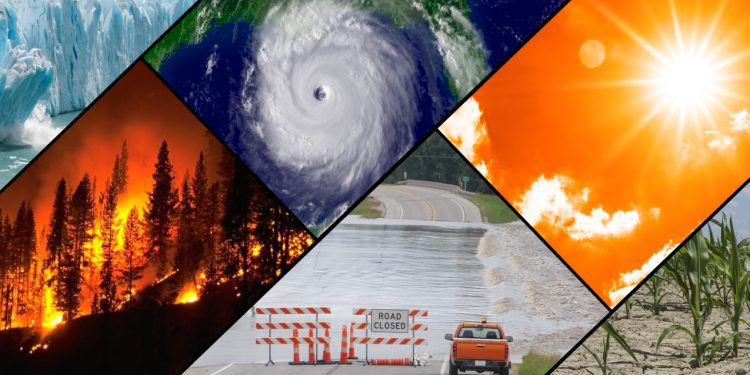CLAIM: John Shewchuk posted on Twitter that global warming is not a serious issue, because severe weather events are decreasing and CO2 is helping to grow more food.
He was responding to a question by another Twitter user, Clova, who said Schoolwork is crazy; why am I defending that global warming is not a serious issue?
Shewchuk responded and supported his claim with infographics on violent tornadoes and carbon dioxide (CO2) as well as that global hurricanes frequency.
He said he is a Certified Consulting Meteorologist (CCM), Creator of the RAOB Programme and CO2 Coalition member in his biography on the social media platform.
“Correct, global warming is not a serious issue, because severe weather events are decreasing and CO2 is helping to grow more food. All the best with your schoolwork,” he said.
Correct, global warming is not a serious issue, because severe weather events are decreasing and CO2 is helping to grow more food. All the best with your schoolwork. https://t.co/6mqifW8Ihs pic.twitter.com/FYHVqRIr6m
— John Shewchuk (@_ClimateCraze) May 18, 2023
The tweet, which was made on May 18 has been viewed by more than 29,000 tweeps, retweeted more than 545 times and liked by 1338 persons as of June 2.
VERIFICATION: Global warming is a phenomenon noticeable in the 1950s, but increasingly prominent in international debate in 1988.
Climate scientists define global warming as the unusually rapid increase in Earth’s average surface temperature over the past century, primarily due to the greenhouse gases released as people burn fossil fuels.
When fossil fuels, a hydrocarbon-containing material such as coal, oil, and natural gas, are burned, which the United Nations (UN) said, release large amounts of carbon dioxide, a greenhouse gas, into the air.
These Greenhouse gases trap heat in the atmosphere, causing global warming. The global average surface temperature has risen from 0.6 to 0.9 degrees Celsius (1.1 to 1.6° F) between 1906 and 2005, and the rate of temperature increase has nearly doubled in the last 50 years. Temperatures are certain to go up further according to NASA, United States’ space agency.
Warming above 1.5°C risks further sea level rise, extreme weather, biodiversity loss and species extinction, as well as food scarcity, worsening health and poverty for millions of people worldwide.
Climate scientists corroborated that as greenhouse gas emissions blanket the Earth, they trap the sun’s heat. This leads to global warming and climate change. The world is now warming faster than at any point in recorded history.
Why global warming is serious global issue
Studies indicate that global warming has devastating effects on the ecosystem. For instance, the United Nations identifies hotter temperature, more severe storms, increased drought, a warming, and rising ocean, loss of species (biodiversity), insufficient foods, poverty and displacement as well as more health risks as some of the consequences of global warming on the planet Earth.
Future changes are expected to include a warmer atmosphere, a warmer and more acidic ocean, higher sea levels, and larger changes in precipitation patterns.
Against the tweep’s claim, scientific research has documented how weather events are becoming more severe, not less. For instance, extreme precipitation, droughts and forest fires have become more frequent and severe as a result of climate change.
Effects of rising CO2
Carbon dioxide (CO2) is a colourless and non-flammable gas at normal temperature and pressure. Although much less abundant than nitrogen and oxygen in Earth’s atmosphere, CO2 is said to be an important constituent of the planet’s air. A molecule of carbon dioxide (CO2) is made up of one carbon atom and two oxygen atoms.
Truly, carbon dioxide is the nutritional basis for aquatic plants which is supplemented through micro and macronutrients and light, according to the JBL, a research-focused website.
The balance between all these elements, JBL, however, explained, is necessary for thriving plant growth in the aquarium.
With about a 40 percent rise in the carbon dioxide levels in the atmosphere since the start of the Industrial Revolution, NASA said, it is raising global temperatures.
Lewis Ziska in his study titled “Rising Carbon Dioxide and Global Nutrition: Evidence and Action Needed”, reported that though carbon dioxide is widely recognised for its role in stimulating photosynthesis and growth for multiple plant species, including crops, the effect is, however, also likely to alter plant chemistry in ways that will denigrate plant nutrition.
Ziska cautioned that carbon dioxide should not be seen as uniformly beneficial since it serves as a nutrient to plants. Rather, he said the benefits for plants do not outweigh the physical disruptions associated with anthropogenic climate change.
“That role is also of tremendous importance, not only from a human health viewpoint but also from a global food–web perspective.
CONCLUSION: The claim that global warming is not a serious issue, because severe weather events are decreasing and CO2 is helping to grow more food is FALSE. Studies reveal that global warming remains a threat to humans health and rising CO2 emissions is also detrimental to food-web perspective.
This fact-check was produced by BONews Service with support from Code for Africa’s PesaCheck, International Fact-Checking Network, and African Fact Checking Alliance network.

